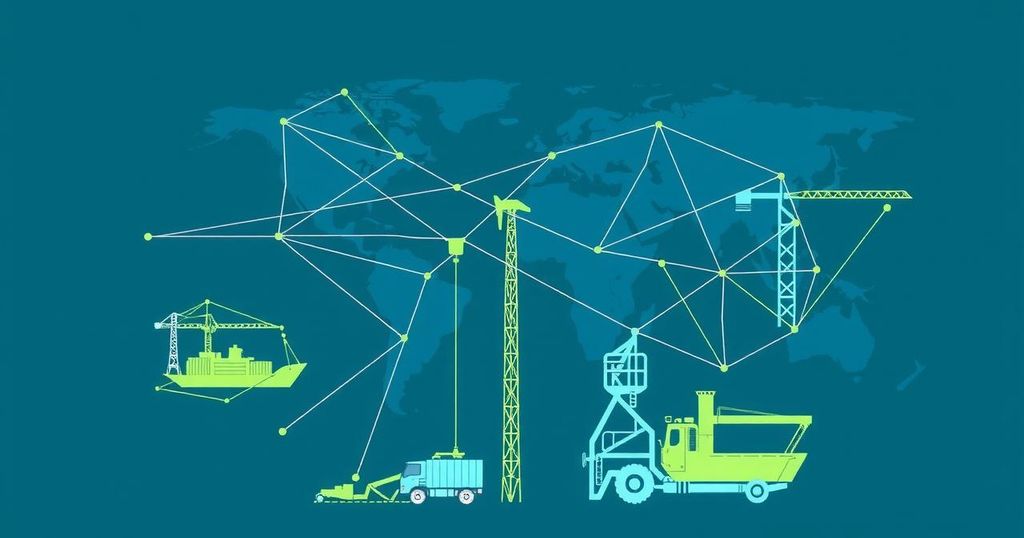Xi Urges Global CEOs to Safeguard Trade Amid Looming Tariffs as UK Economy Adjusts
President Xi Jinping of China convened global CEOs urging protection of supply chains amid U.S. tariff concerns. As markets react negatively, the UK sees increased property transactions and a rise in household savings. Meanwhile, the British trade deficit expands, but GDP growth for 2024 is revised upwards. WH Smith restructures amidst economic challenges.
In response to growing concerns about impending tariffs from President Trump, President Xi Jinping of China convened a meeting of notable global CEOs in Beijing. He emphasized the importance of safeguarding industrial and supply chains amid increasing trade tensions with the United States. Executives from major companies such as AstraZeneca, FedEx, and Toyota participated, highlighting the critical role international firms play in China’s economy. Xi criticized the trade barriers enacted by other nations and urged collaborative efforts to alleviate tensions.
As fears mount over Trump’s upcoming “Liberation Day” announcement, which is anticipated to introduce reciprocal tariffs, stock markets in the Asia-Pacific region have experienced declines, with China’s CSI 300 slipping by 0.44% and South Korea’s Kospi by 2%. The automotive sector continues to feel the impact of the previously announced 25% tariffs on imports, with firms like Hyundai Motors seeing a drop in shares. Per the analysis from Swissquote Bank, overall sentiment remains negativity influenced by tariff discussions.
In the UK, recent data indicates a rise in household purchases in February as individuals hurry to complete transactions prior to stamp duty increases. The HMRC reported a 13% increase in residential transactions from January, indicating first-time buyers are acting decisively to avoid the impending financial burden. As the economy adjusts to changes, experts forecast UK property prices to rise by 2.5% in 2024, despite persistent economic uncertainty and potential inflation.
Meanwhile, India is attempting to soothe relations with the U.S. by proposing tariff cuts on agricultural imports, while Canada and Spain express concerns over the impacts of U.S. tariff policies. The job market in Germany, however, is struggling, as newly released data show an increase in unemployment, underscoring economic challenges faced by the Eurozone.
In the UK, households have increased their saving ratio to 12%, signaling apprehension regarding the economic outlook. Additionally, the retail sector has shown signs of improvement with a 1% growth in sales for February; however, analysts caution that future performance may not be as strong due to seasonal variances. Concurrently, the UK’s trade deficit has widened significantly, illustrating ongoing economic pressures. However, ONS reports also suggest that the UK may have narrowly avoided recession in 2024 with GDP growth revised modestly upwards to 1.1%.
Despite a tumultuous economic landscape, WH Smith is restructuring its operations through a £76 million sale of its high street business, enabling a greater focus on its travel retail segment amidst a backdrop of fluctuating share prices and market uncertainty. The strategic pivot reflects a need to adapt within a challenging environment, reinforcing the delicate balance of global trade and commerce today.
In summary, President Xi’s meeting with global executives demonstrates China’s proactive stance amid escalating trade tensions with the U.S., while the UK engages in various economic adjustments as it faces both opportunity and uncertainty. The data reveals a mixed economic landscape, with rising retail sales juxtaposed against an expanding trade deficit and cautious consumer behavior. Overall, international trade dynamics are shifting, necessitating agile responses from businesses worldwide, as exemplified by WH Smith’s recent restructuring efforts. The ongoing negotiations and adjustments reflect the critical need for collaboration and strategic foresight in navigating the complexities of the global economy.
Original Source: www.theguardian.com








Post Comment